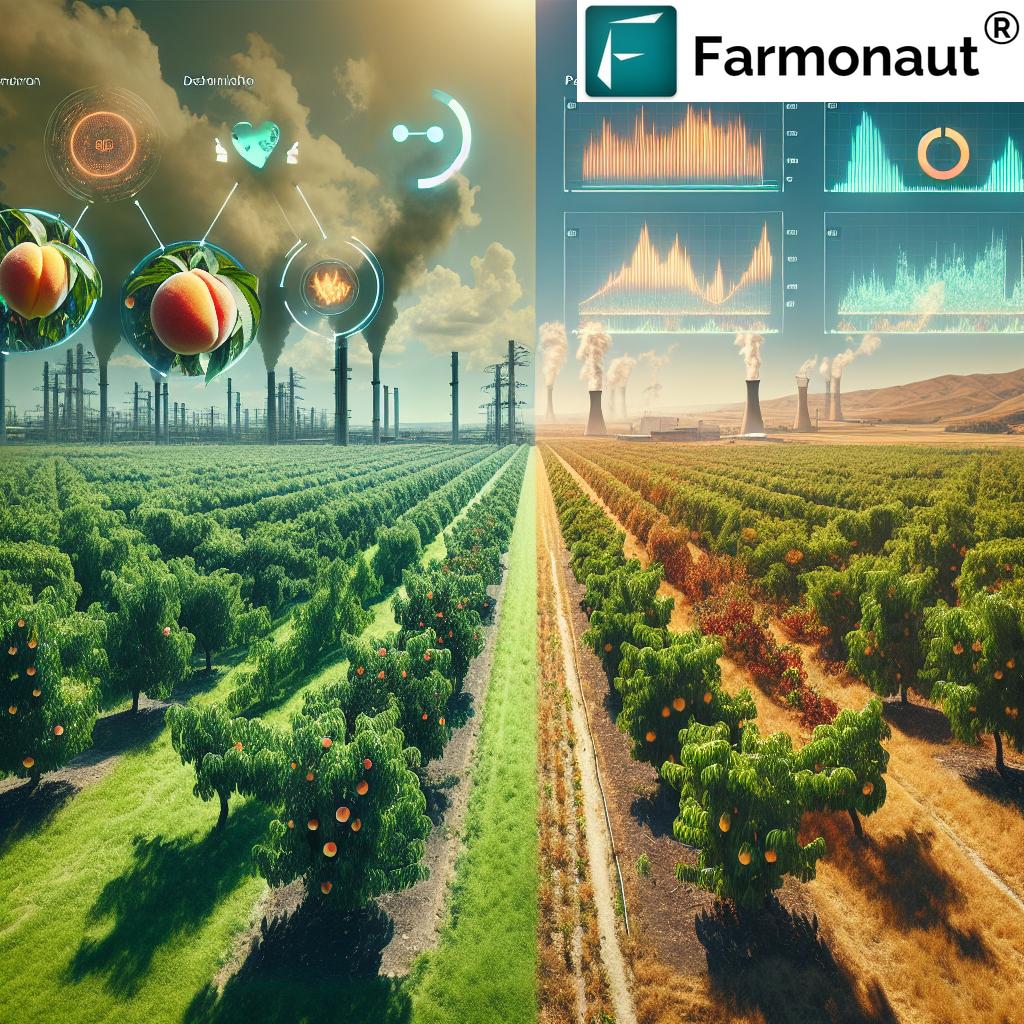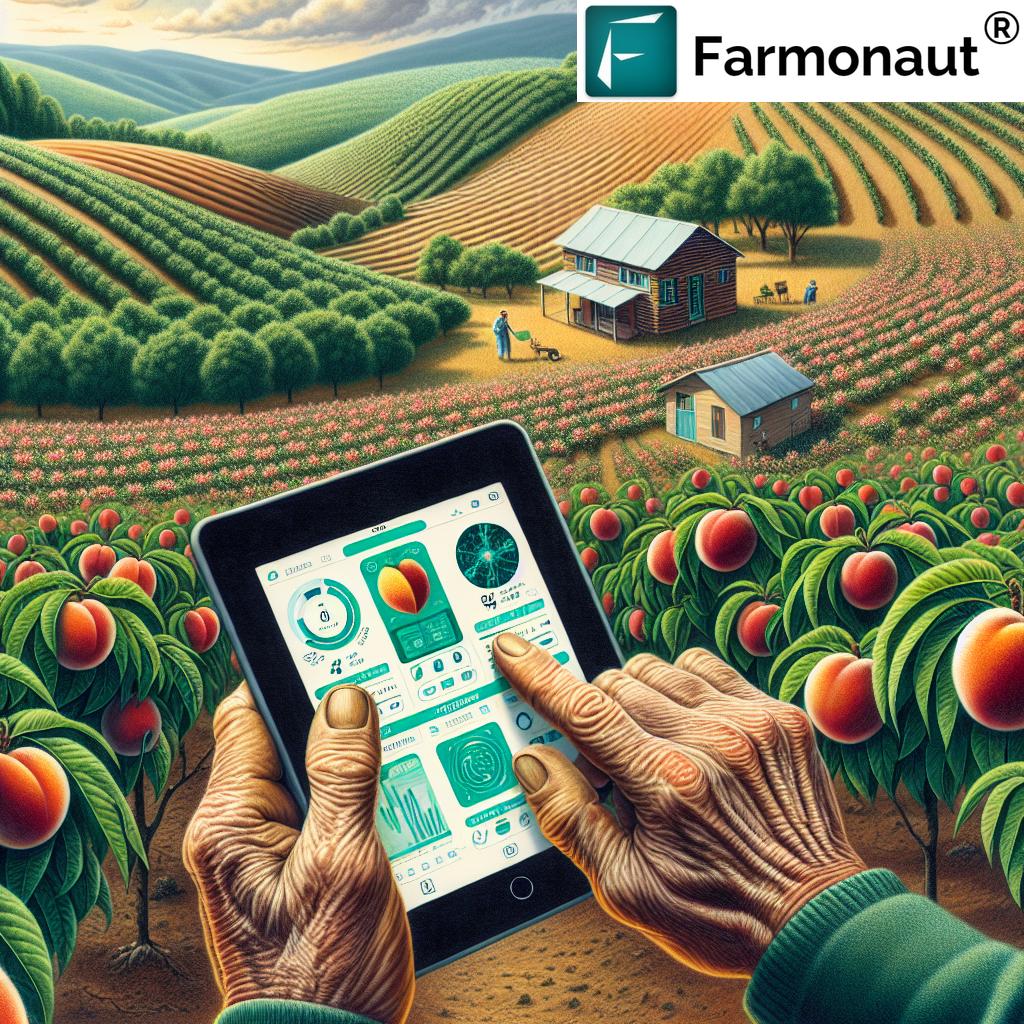Georgia’s Peach Farmers Embrace Innovative Solutions: How Farmonaut’s Technology Tackles Climate Change Challenges
“Georgia’s peach industry, worth over $71 million annually, faces up to 80% crop loss due to climate change-induced late frosts.“
As we delve into the heart of Georgia’s agricultural landscape, we find ourselves grappling with a bittersweet reality. The state’s beloved peach industry, a symbol of Southern charm and a cornerstone of local economy, is facing unprecedented challenges. Climate change has emerged as a formidable adversary, threatening not just the livelihoods of farmers but also the very essence of Georgia’s agricultural identity. However, amidst these trials, innovative solutions are blossoming, offering hope for a resilient and sustainable future.
The Changing Face of Georgia’s Peach Farming
Georgia, fondly known as the Peach State, has long prided itself on producing some of the sweetest and juiciest peaches in the nation. However, the changing climate is casting a shadow over this cherished tradition. Peach farmers across the state, from the rolling hills of Fort Valley to the suburban landscapes of Atlanta, are witnessing firsthand the impacts of climate change on their crops.
- Unpredictable weather patterns
- Late frosts damaging early blooms
- Erratic rainfall affecting irrigation needs
- Rising temperatures altering growing seasons
- Increased pest and disease pressure
These factors combine to create what Dr. Emily Carter, an agricultural scientist at the University of Georgia, calls a “perfect storm” for peach farmers. The delicate balance required for successful peach cultivation is being disrupted, leading to a decline in production and quality.
The Economic Impact of Climate Change on Georgia’s Peach Industry
The ripple effects of climate change on Georgia’s peach industry extend far beyond the orchards. As a significant contributor to the state’s economy, any disruption in peach production has wide-reaching consequences:
- Reduced crop yields leading to financial strain for farmers
- Potential job losses in related industries
- Decreased revenue for local communities
- Threat to Georgia’s agricultural heritage and identity
Sarah Jenkins, a third-generation peach farmer in Fort Valley, shares her perspective: “We’re not just fighting to save our farms; we’re fighting to preserve a way of life that has defined our community for generations. The challenges we face today are unlike anything our parents or grandparents encountered.”
Innovative Solutions: Farmonaut’s Technology to the Rescue
In the face of these challenges, innovative agricultural technology is emerging as a beacon of hope. Farmonaut, a pioneering agricultural technology company, is at the forefront of this revolution, offering advanced, satellite-based farm management solutions that are transforming the way Georgia’s peach farmers approach their craft.
“Farmonaut’s precision agriculture technology can reduce water usage in peach farming by up to 30%, promoting sustainable cultivation.“
Farmonaut’s suite of tools and technologies is specifically designed to address the unique challenges faced by peach farmers in Georgia:
Satellite-Based Crop Health Monitoring
Farmonaut utilizes multispectral satellite imagery to provide real-time insights into crop health. This technology allows farmers to:
- Monitor vegetation health through NDVI (Normalized Difference Vegetation Index)
- Track soil moisture levels across their orchards
- Identify potential issues before they become visible to the naked eye
By leveraging this data, peach farmers can make informed decisions about irrigation, fertilizer application, and pest management, optimizing their resources and improving crop resilience.
Jeevn AI Advisory System
Farmonaut’s AI-driven personalized farm advisory tool, Jeevn AI, is revolutionizing decision-making in peach orchards. This system:
- Analyzes satellite data and local weather patterns
- Provides customized recommendations for crop management
- Offers real-time alerts for potential frost events or other weather-related risks
For Georgia’s peach farmers, this means being able to anticipate and mitigate the impacts of unpredictable weather, potentially saving entire crops from devastating late frosts.
Water Conservation and Management
With erratic rainfall patterns becoming the norm, efficient water management is crucial. Farmonaut’s technology helps farmers:
- Optimize irrigation schedules based on real-time soil moisture data
- Reduce water waste through precision application
- Monitor water stress in peach trees to prevent yield loss
This not only promotes sustainable farming practices but also helps farmers navigate periods of drought or excessive rainfall.
Climate-Resilient Crop Varieties
While not directly providing crop varieties, Farmonaut’s data analytics can assist researchers and farmers in:
- Identifying peach varieties that show resilience to changing climate conditions
- Tracking the performance of different varieties across various microclimates in Georgia
- Informing breeding programs aimed at developing more climate-adaptive peach varieties
This data-driven approach to crop selection and breeding is crucial for ensuring the long-term viability of Georgia’s peach industry.

Implementing Farmonaut’s Solutions in Georgia’s Peach Orchards
The adoption of Farmonaut’s technology by Georgia’s peach farmers represents a significant shift towards precision agriculture. Here’s how farmers are implementing these solutions:
- Initial Assessment: Farmers begin by mapping their orchards using Farmonaut’s satellite imagery.
- Data Integration: Historical weather data and soil information are integrated into the system.
- Customized Planning: The Jeevn AI system develops tailored management plans for each orchard.
- Continuous Monitoring: Regular satellite updates provide ongoing insights into crop health and environmental conditions.
- Adaptive Management: Farmers adjust their practices based on real-time data and AI-driven recommendations.
By embracing these technologies, Georgia’s peach farmers are not only addressing current challenges but also positioning themselves for long-term success in a changing climate.
The Future of Sustainable Peach Farming in Georgia
As we look to the future, the integration of Farmonaut’s technology with traditional farming practices offers a promising path forward for Georgia’s peach industry. This fusion of innovation and tradition is creating a new paradigm for sustainable agriculture:
- Enhanced resilience to climate variability
- Improved resource efficiency, particularly in water and fertilizer use
- Reduced environmental impact through precision management
- Preservation of Georgia’s peach farming heritage for future generations
Dr. Carter emphasizes, “The adoption of precision agriculture technologies like those offered by Farmonaut isn’t just about survival; it’s about thriving in the face of change. These tools are empowering our farmers to make data-driven decisions that benefit both their businesses and the environment.”
Beyond the Orchard: Sustainable Living and Tiny Homes
Interestingly, the movement towards sustainability in Georgia’s agriculture is mirrored by a parallel trend in housing and lifestyle choices. The rise of tiny homes in Georgia represents a broader shift towards more sustainable and affordable living options. This trend reflects Georgians’ desire to reduce their environmental footprint and adapt to changing economic realities.
The Tiny Home Movement in Georgia
Tiny homes, typically defined as dwellings under 400 square feet, are gaining popularity across Georgia for several reasons:
- Reduced environmental impact
- Lower housing costs
- Simplified lifestyle
- Increased mobility and flexibility
David Miller, a tiny home builder in Atlanta, notes, “We’re seeing increased interest from people of all ages who want to live more intentionally. Tiny homes offer a way to reduce one’s environmental footprint while also gaining financial freedom.”
Connecting Sustainable Housing to Sustainable Farming
The tiny home movement and sustainable farming practices share common goals:
- Resource efficiency
- Minimizing environmental impact
- Adapting to changing economic and environmental conditions
For some peach farmers, embracing tiny homes on their properties offers a unique opportunity to diversify income streams while aligning with sustainable living principles.
Challenges and Opportunities
While the integration of advanced agricultural technology and sustainable living practices offers numerous benefits, it’s not without challenges:
Technology Adoption
- Initial investment costs for implementing Farmonaut’s solutions
- Learning curve for farmers transitioning to precision agriculture
- Ensuring reliable internet connectivity in rural areas
Regulatory Landscape
- Navigating zoning laws for tiny homes on agricultural land
- Adapting regulations to support innovative farming practices
- Ensuring data privacy and security in digital farming
Cultural Shift
- Balancing traditional farming knowledge with new technologies
- Changing perceptions about housing and lifestyle choices
- Building community support for sustainable agricultural and housing practices
Despite these challenges, the opportunities for creating a more resilient and sustainable future for Georgia’s peach industry and its communities are significant.

The Road Ahead: Integrating Technology and Tradition
As Georgia’s peach farmers navigate the complexities of climate change and evolving agricultural practices, the integration of Farmonaut’s technology offers a path forward that honors tradition while embracing innovation. This approach not only addresses immediate challenges but also sets the stage for a more sustainable and resilient agricultural future.
Key strategies for the future include:
- Continued research and development of climate-resilient peach varieties
- Expansion of precision agriculture training programs for farmers
- Collaboration between farmers, technologists, and policymakers to create supportive frameworks for sustainable agriculture
- Exploration of synergies between sustainable farming and alternative housing solutions like tiny homes
By embracing these strategies and leveraging the power of technology, Georgia’s peach industry can not only survive but thrive in the face of climate change, ensuring that future generations can continue to enjoy the sweet taste of Georgia peaches.
Comparative Table: Climate Change Impact and Solutions for Georgia’s Peach Farming
| Climate Change Challenge | Impact on Peach Farming | Farmonaut’s Solution |
|---|---|---|
| Unpredictable Weather Patterns | 15-25% yield variability | Weather pattern analysis for optimal planting dates |
| Late Frosts | Up to 80% crop loss in affected areas | Early frost warning system through Jeevn AI |
| Erratic Rainfall | 20-30% increase in irrigation needs | Precision irrigation scheduling based on soil moisture data |
| Soil Moisture Variability | 10-15% reduction in fruit quality | Real-time soil moisture monitoring and management |
| Pest and Disease Pressure | 25-35% increase in crop protection costs | Early detection of pest and disease outbreaks through satellite imagery |
Embracing a Sustainable Future
As we conclude our exploration of Georgia’s peach industry and the innovative solutions offered by Farmonaut, it’s clear that the future of agriculture lies at the intersection of tradition and technology. The challenges posed by climate change are formidable, but they also present an opportunity for transformation and growth.
Georgia’s peach farmers, armed with cutting-edge tools and a deep-rooted passion for their craft, are poised to write the next chapter in the state’s agricultural story. By embracing precision agriculture, sustainable practices, and innovative living solutions, they are not just preserving a beloved tradition – they are cultivating a resilient and thriving future for generations to come.
As we look ahead, the sweet aroma of Georgia peaches serves as a reminder of the enduring spirit of adaptation and innovation that defines American agriculture. With companies like Farmonaut leading the way in agricultural technology, and farmers ready to embrace new solutions, the future of Georgia’s peach industry is not just sustainable – it’s ripe with possibility.
FAQs
- How is climate change specifically affecting Georgia’s peach farms?
Climate change is causing unpredictable weather patterns, late frosts, erratic rainfall, and rising temperatures, all of which disrupt the delicate balance required for peach cultivation. - What are some of the key features of Farmonaut’s technology for peach farmers?
Farmonaut offers satellite-based crop health monitoring, AI-driven farm advisory systems, precision irrigation tools, and weather pattern analysis to help farmers make data-driven decisions. - How can Farmonaut’s solutions help reduce water usage in peach farming?
By providing real-time soil moisture data and precise irrigation recommendations, Farmonaut’s technology can help farmers optimize their water use, potentially reducing consumption by up to 30%. - Are there any success stories of Georgia peach farmers using Farmonaut’s technology?
While specific case studies are not provided, many Georgia peach farmers are adopting precision agriculture technologies to improve crop resilience and efficiency in the face of climate challenges. - How does the tiny home movement relate to sustainable peach farming in Georgia?
Both trends reflect a broader shift towards sustainability and resource efficiency. Some farmers are considering tiny homes as a way to diversify income and align with sustainable living principles.
For more information on how Farmonaut can help your farming operations, visit their website or explore their mobile apps:
For developers interested in integrating Farmonaut’s technology into their own applications, check out the API and API Developer Docs.





